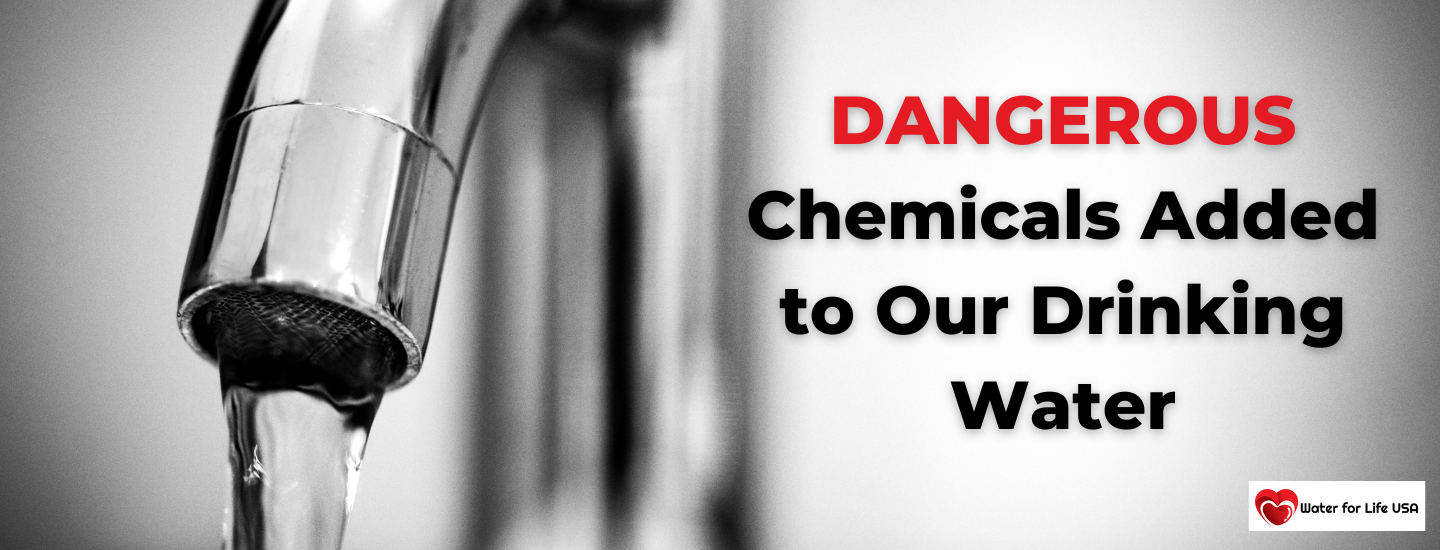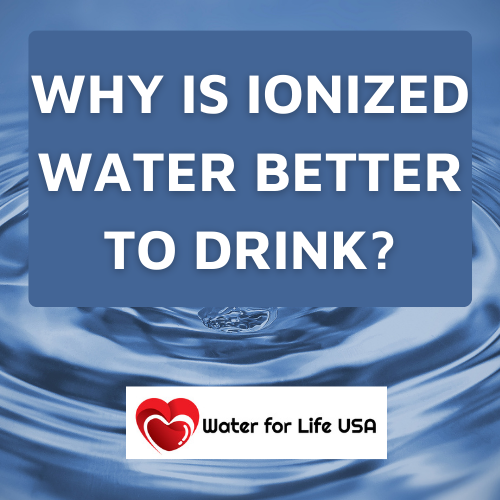HydroHeat Thermal Water Ionizer

Celebrating 14 Years in Business and an A+ BBB Rating!

Table of Contents
ToggleOur public water treatment facilities add chemicals to our drinking water to kill bacteria and viruses and keep water pipes clean. Many of those chemicals are unhealthy for us to digest, and some have even been linked to cancer. You can remove those chemicals with a multistage water filter like what’s found in our premium alkaline water ionizers. Here are some of the most common chemicals that public water systems add to your drinking water.
Chlorine:
Chlorine is a “highly reactive and corrosive greenish-yellow gas with a strong odor.” It is part of the Halogen group on the period table of elements, a group of unnatural gasses. Chlorine gas is commonly produced by the electrolysis of brine (sodium chloride solution), known as the chloralkali process.
Chlorine oxidizes, so it kills bacteria, viruses, and other pathogens in our drinking water. It’s the chemical you will most likely smell in a glass of tap water. It smells like a spa or swimming pool. The stronger the smell, the higher the amount of chlorine!
Drinking chlorine can affect our health in several ways, including:
* Irritation of the eyes, nose, and throat: Chlorine can irritate the sensitive tissues in the eyes, nose, and throat, causing redness, itching, and discomfort.
* Skin irritation: Exposure to high levels of chlorine in water can also cause skin irritation, such as dryness, itching, and rashes.
* Respiratory problems: Prolonged exposure to high chlorine levels in drinking water can cause respiratory problems, such as asthma, bronchitis, and other respiratory illnesses.
* Stomach discomfort: Drinking water with high chlorine levels can cause stomach discomfort, such as nausea, vomiting, and diarrhea.
* Increased risk of cancer: Evidence suggests that long-term exposure to chlorinated drinking water may increase the risk of certain types of cancer, such as bladder and colon cancer.
The bottom line is chlorine is an industrially produced gas that we should not consume. It is unnatural to our body and will cause serious damage if we are exposed to too much of it.
Fluoride:
You’ve probably heard of fluoride. Not only is it added to our toothpaste and mouthwash, but it’s also added to our drinking water. The average American is exposed to fluoride throughout the day. There has been much debate about whether this is a good idea. Here are some of the facts:
Fluoride, like chlorine, is part of the Halogen group of gasses. It can form compounds with other elements; therefore, the fluoride added to our drinking water is in the form of fluoride salts, such as sodium fluoride.
Fluoride is added to our dental products and drinking water because it combines with the calcium in our teeth to make them harder and more resistant to tooth decay. While this seems to work well in the short term and may even help people who can’t afford the dentist, long-term fluoride exposure has been linked with many health problems. Here are some of them:
* Dental fluorosis. Prolonged exposure to high fluoride levels during childhood can cause dental fluorosis, which causes white spots, streaks, or pitting on the teeth. Severe cases of dental fluorosis can cause brown stains and surface irregularities on the teeth.
* Skeletal fluorosis. Long-term exposure to high fluoride levels can cause skeletal fluorosis, a condition that affects the bones and joints. Symptoms of skeletal fluorosis include joint pain, stiffness, limited mobility, spinal cord compression, and other bone and joint problems.
* Neurological effects. Some studies have suggested that high fluoride levels in drinking water may be associated with cognitive and developmental problems, such as reduced IQ scores and impaired neurological development in children.
* Thyroid problems: Some research has also suggested that high fluoride levels in drinking water may be associated with thyroid problems, including hypothyroidism and an increased risk of goiter.
Over 70% of the U.S. population served by public water systems is estimated to receive fluoridated water. Some areas in the U.S. that are known to have higher levels of fluoride added to their drinking water due to artificial fluoridation programs include:
1. Some parts of the Midwest and Northeast: States such as Iowa, Minnesota, Ohio, Michigan, and Massachusetts have a relatively high percentage of their population receiving fluoridated water.
2. Western states with fluoridation programs: Some communities like California, Oregon, and Washington also have fluoridation programs.
3. Urban and suburban areas: Fluoridation programs are more commonly implemented in urban and suburban areas compared to rural areas in the U.S. Cities such as New York City, Los Angeles, Chicago, and Philadelphia have fluoridation programs in place.
Parts of Texas, Colorado, and South Dakota, have been reported to have higher prevalence rates of dental and skeletal fluorosis. This has to do with the naturally occurring fluoride in those states. Those areas should also be concerned about neurological damage caused by fluoride.
Some studies have suggested that fluoride may interfere with various biochemical and physiological processes in the brain, potentially leading to neurological effects. For example, animal studies have shown that high levels of fluoride can accumulate in the brain and may affect neurotransmitter levels, oxidative stress, and neuroinflammation, which could contribute to neurological problems and even lower IQ.
Children are particularly vulnerable to over-exposure to fluoride because their brains are still developing.
Aluminum Sulfate:
Aluminum sulfate is an aluminum salt used to clarify water and remove impurities in a process called coagulation-flocculation. It works by forming solid particles (flocs) that can trap and remove impurities, which are then removed through sedimentation or filtration.
Your public water system generally does a good job in filtering out aluminum sulfate to safe levels before you drink it. However, ingestion of high concentrations of aluminum sulfate or prolonged exposure to elevated levels of aluminum through drinking water can potentially have health effects such as:
1. Gastrointestinal effects: Ingesting high concentrations of aluminum sulfate can potentially cause gastrointestinal effects such as nausea, vomiting, and diarrhea.
2. Neurotoxicity: Prolonged exposure to high levels of aluminum, including from drinking water contaminated with aluminum sulfate, has been associated with neurotoxicity in some studies, with potential effects on cognitive function and behavior.
3. Bone health: Some studies have suggested a possible link between aluminum exposure, including from drinking water, and bone health, with increased risk of osteoporosis and bone fractures in certain populations.
4. Kidney function: Elevated levels of aluminum in drinking water have been associated with potential kidney effects in some studies, including impaired kidney function.
In the United States, the U.S. Environmental Protection Agency (EPA) has established a secondary drinking water standard for aluminum, which is set at 0.05 milligrams per liter. But the problem with this standard, and all other EPA standards, is that it’s non-enforceable. It’s just a guideline; some public water systems follow it better than others. That means the aluminum sulfate level you ingest from tap water may be higher or lower, depending on where you live.
If you are experiencing any of the above health effects, consult a doctor immediately.
Calcium Hydroxide:
Calcium hydroxide is calcium bonded with two hydroxides. It is commonly known as slaked or hydrated lyme. It has a strong basic nature, high alkalinity, and the ability to react with acids. It’s used to help adjust the pH of water and to help prevent corrosion in pipes.
Drinking too much calcium hydroxide can result in an adverse reaction in the body due to its high alkalinity and can cause the following effects:
1. Gastrointestinal issues: Calcium hydroxide can cause irritation and inflammation of the gastrointestinal tract, leading to symptoms such as abdominal pain, nausea, vomiting, and diarrhea. In severe cases, it can result in gastrointestinal bleeding or perforation.
2. Alkalosis: Calcium hydroxide can significantly raise the pH level in the blood, leading to a condition known as alkalosis. Alkalosis can cause symptoms such as confusion, muscle weakness, and tremors, and in severe cases, it can lead to seizures or coma.
3. Chemical burns: Calcium hydroxide can cause burns or irritation to the skin, eyes, and mucous membranes if it directly touches these tissues. Ingestion of calcium hydroxide can also cause mouth, throat, and esophagus burns.
4. Systemic toxicity: Ingesting large amounts of calcium hydroxide can result in systemic toxicity, affecting multiple organs in the body. This can cause symptoms such as weakness, fatigue, confusion, and irregular heartbeat.
However, when used in water treatment, calcium hydroxide undergoes chemical reactions that form calcium carbonate, which is not harmful to human health and is commonly found in natural water sources. Calcium and carbonate ions are essential minerals commonly found in many foods and are also naturally present in the human body.
Calcium hydroxide is generally not a risk to public health unless there is a problem in the public water system that results in too much getting into our tap water.
The bottom line is if you are experiencing any of the symptoms above, it may be caused by the chemicals added to your drinking water by your public water system. You should protect yourself and your family with a multistage water filter like what you find in our premium alkaline water ionizers.

Get HOT ionized water! That's just one of the amazing new features of our HydroHeat Thermal Water Ionizer.

Save 15% on NEW water ionizers during our Spring Sale! Did you know that warmer weather and increased exercise often leads to dehydration? Give your body the hydration it wants with our premium ionized water, on sale now! Use code Spring15.

Generous wholesale discounts and drop-shipping available. If you run a health-centered or water-centered business, we want you! Please send us an email that introduces your business to info@waterforlifeusa.com or call us at 877-255-3713.

Confused about pH? Want to know the pH of milk? Or bananas? Or soda? Download this free easy-to-use pH Solutions chart. Just click on the graphic above.

Reverse osmosis? Carbon filter? Distiller? Find out why a water ionizer is better! Join Alderin Ordell, owner of Water for Life USA, as he explains pH, ORP, antioxidants in water, the history of water ionizers, and even what the experts have to say about the health benefits of ionized water.

We offer in-house payment plans. They require a 50% down payment and the rest is paid in three monthly installments. Call 877-255-3713 for more information.


Water for Life USA now has Apple Pay available for all purchases. Order with confidence using Apple Pay!
"Since I haven't been to a doctor in a good while, I decided to go and visit him. I was down 37
pounds and my blood pressure, heart rate, and body temperature were well within range. He
702-765-4183